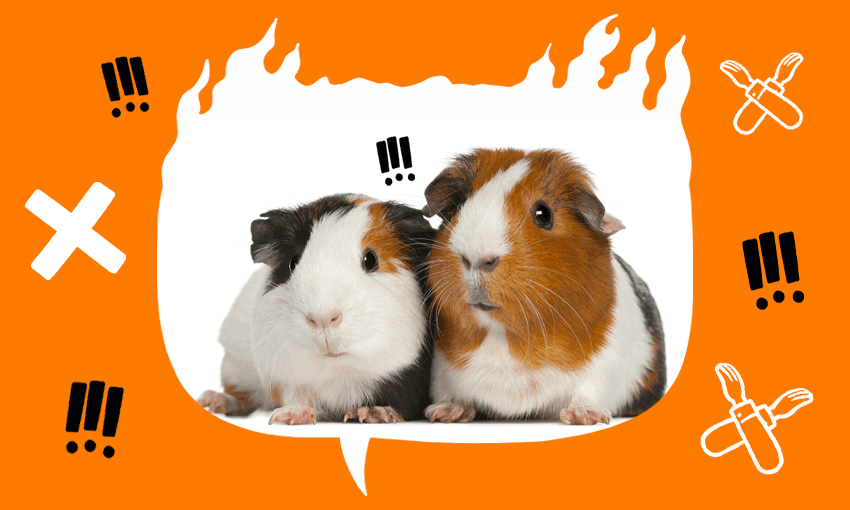Summer read: High maintenance and hard to love, the toothy little furballs don’t stay cute for long.
First published August 14, 2022
I used to be like you, once. I had optimism. Freedom. Hope.
My house smelled normal. My clothes were tidy, and my grooming was fine. I didn’t walk around Wellington not knowing I had straw stuck to my tights, or a tiny turd clinging to my cardigan.
I could pass a pet shop without going in. I’d never buy hay by the bale, carrots in bulk or vials of Ivermectin, in cash, from people who knew people. But now I do it all, because we have guinea pigs. Guinea pigs are the worst.
Guinea pig owners aren’t normal. They’re screwy in the head. It’s not clear whether the guinea pigs screwed them or if they were screwy to start with, which attracted them to the guinea pigs. Anyway, I know someone with a dead pet pig, George, in the freezer. She’s waiting for their other pig Bryan to pass, so they can be buried together. What’s worse, when I heard this, it seemed reasonable. This is because I have now joined her club.
Our daughter begged for months for a guinea pig. There wasn’t a heap I liked about the idea as we already had a cat. But the novelty appealed. In Karori most people have a poodle mix, so getting a pig felt bohemian. Almost like getting a snake.
Every library book and pet shop vouched hard for the sweetness of guinea pigs. They’re odourless! Smart! We watched the Guinea Pig Olympics on YouTube, where pigs shot through hoops and bounced over seesaws in a blur of pink claws, ginger fur and goofy overbites.
What finally got her over the line was her PowerPoint presentation to her father. He loves a business case and so the next afternoon dragged home a hutch, a sack of pellets and a food bowl for small mammals, shaped like an upturned leaf. Cute! I turned the dish over and that piece of junk had cost $24.
Next, we visited a guinea pig sanctuary, whose rows of inmates eyeballed us as we chose. Turns out these are sociable animals, and you need to get at least two of them. The pair must already be bonded or might rip chunks off each other (wait, what?). Meanwhile the custodian told us several of these pigs had been returned by owners who, sadly, could no longer keep them. Not asking “Why, exactly?” may be the regret of my life.
We took home two males: a big patchy one we called Truffle and a little black one, Pudding. They shot straight into their nesting boxes and took two months to forgive us. They expressed their disdain through the medium of urine and lozenge-shaped excrement, and by eating their excrement. I’m not sure my daughter is over the shock. By week two, the guinea pigs had become mine.
These pigs pee so much, they soak five absorbent puppy pads at a time. I fill half a bin-bag with mucky straw every second day. I clean, chop vegetables, check them for lice. I provide enrichment for their tiny brains (empty toilet rolls and ping pong balls). I talk to them like they’re listening, but they’re just waiting for me to sod off. Guinea pigs are prey animals and see everything as a threat. I can understand why, because now I too want to kill them.
The other day I got excited because Pudding tossed his nose and exposed his wobbly double-chin to me. It felt profound, like a human-to-animal breakthrough. But I looked it up and he was just asserting his dominance. The rat-faced little prick.

